The Gongshan Muntjac, a remarkable deer species found in the lush forests of East Asia. With its distinctive characteristics and habits, this elusive creature has piqued the curiosity of wildlife enthusiasts around the world. Let's embark on a journey to unveil the secrets of the Gongshan Muntjac.
Table of Contents
Species Data
- Class: Mammalia
- Order: Artiodactyla
- Family: Cervidae
- Scientific Name: Muntiacus gongshanensis
- Life Span: Typically 8-10 years
- Height: Approximately 40-50 cm (16-20 inches)
- Weight: Around 15-30 kg (33-66 pounds)
Description
The Gongshan Muntjac, scientifically known as Muntiacus gongshanensis, is a small deer species renowned for its unique features. This muntjac is characterized by its russet-brown coat and short antlers in males.
Appearance
These charming deer sport a compact build with slender legs and a graceful posture. Their reddish-brown fur is accentuated by striking facial markings, adding to their allure.
Behavior
Gongshan Muntjacs are known for their solitary nature and are primarily crepuscular, becoming active during dawn and dusk. They are agile and cautious animals, skillful at avoiding predators.
Habitat
These elusive deer inhabit the dense forests and mountainous regions of East Asia, where their excellent camouflage skills help them navigate their rugged terrain.
Diet and Nutrition
Gongshan Muntjacs are herbivores, feeding on a variety of plant materials such as leaves, fruits, and buds. Their dietary habits play a vital role in shaping the ecosystem of their habitat.
Mating Habits
During the breeding season, males emit distinctive vocalizations to attract females and establish their territory.
Mating Behavior
- Reproduction Season: Typically occurs from October to December.
- Pregnancy Duration: Around 210 days.
- Baby Carrying: Mothers provide attentive care to their fawns.
- Independent Age: Fawns gradually gain independence after several months.
- Female Name: Doe
- Male Name: Buck
- Baby Name: Fawn
5 Fun Facts for Kids
- Gongshan Muntjacs are often called “barking deer” due to their distinctive vocalizations resembling barks.
- They possess sharp, curved canine teeth known as “tusks,” which are unique among deer species.
- Their solitary nature makes them excellent at hiding from potential threats.
- These deer are expert swimmers and are not deterred by rivers when seeking food or evading predators.
- Conservation efforts are crucial to protect the habitat of Gongshan Muntjacs and ensure their survival.


